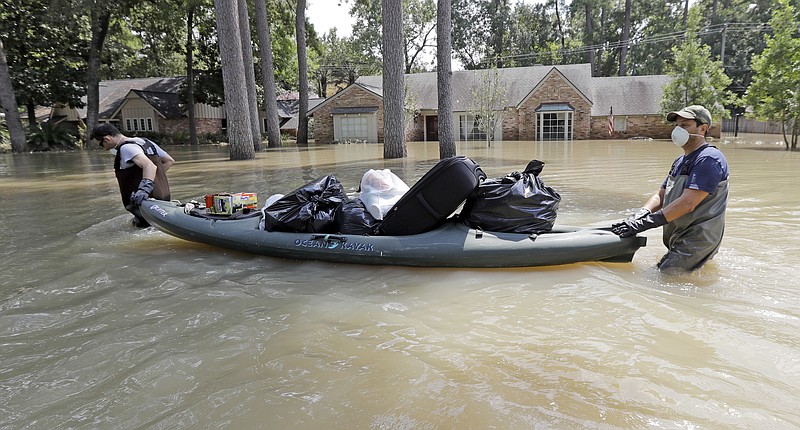HOUSTON (AP) - While the number of evacuees seeking refuge in Houston's emergency shelters dwindled 10 days after Harvey struck, many people who had left by Monday still faced dire housing needs.
Some returned to public housing complexes inundated with sewage and mud. More than 50,000 went to government-paid hotels, some far away from homes and schools. Others moved in with family and friends.
Harvey did not discriminate, inundating exclusive neighborhoods and low-lying apartments for the poor, and was blamed for at least 60 deaths. Most of the evacuees at the George R. Brown Convention Center were lower-income, but some were from wealthier areas.
Now, about 1,500 remain at the convention center, and several said they were homeless, disabled or from public housing. Another 2,800 were at the NRG Center, another convention center that opened after George R. Brown reached double its original capacity.
Harvey struck Texas on Aug. 25 as a Category 4 hurricane, but brought the worst flooding to Houston and other areas as a tropical storm. The rain totaled nearly 52 inches in some spots.
Mayor Sylvester Turner has declared Houston "open for business," and offices and restaurants across downtown are expected to reopen Tuesday after the Labor Day holiday.
Concerns about further explosions at a damaged chemical plant eased after officials on Sunday carried out a controlled burn of highly unstable compounds at the Arkema plant in Crosby. Three trailers had previously caught fire after Harvey's floodwaters knocked out generators.
Authorities said it was safe for residents of a 1.5-mile evacuation zone around the Arkema plant to return. They were forced to leave Aug. 29.
The Federal Emergency Management Agency said 53,630 residents displaced by Harvey are currently staying in government-funded hotel rooms.
The temporary housing has been provided for 18,732 households, FEMA spokesman Bob Howard said. Once people are granted the assistance, there is a minimum allotment of 14 days, but that can be extended on a case-by-case basis.
FEMA officials also are weighing other options such as mobile homes should the need arise.
After Hurricane Katrina struck New Orleans in 2005, FEMA bought thousands of mobile homes for people left homeless, but the program was plagued by problems. Some victims who lived in the homes were exposed to high levels of formaldehyde, which was used in building materials.
While there were signs of hope for some displaced by Harvey, others were not so lucky. Some residents of the Clayton Homes returned to apartments filled with water and floors caked in mud and sewage.
Clayton Homes residents were among the first to arrive at the convention center last weekend, many riding in the back of city dump trucks. The complex is bounded on one side by an interstate highway and on another by Buffalo Bayou, the muddy waterway that jumped its banks and sent water rushing into people's homes.
Piles of garbage and soggy furniture sat next to the gnarled remains of a fence separating the bayou from the complex. The rotting stench was present in parts of the complex.
D'Ona Spears and Brandon Polson managed to get a FEMA-funded hotel room near downtown but got kicked out after one night for lack of state identification. All of her paperwork had been lost in the floodwaters, Spears said.
The family went to the Toyota Center, the basketball arena near the convention center also housing evacuees. Then they were taken to a motel in Humble, a small city near Houston's international airport about 20 miles away.
Spears said they have no transportation and no way of getting the children to school when it resumes next week.
"You can't just pick the hotel," she said. "You have to go further out, further out, further out."
Morris Mack sat outside the main entrance to the convention center, sharing a cigarette with another person as a military band played in the background.
Mack arrived there Aug. 30 and hadn't been able to re-enter his home in a public housing development in northwest Houston.
While he registered for FEMA assistance, Mack's cellphone was wrecked by floodwaters, and he didn't have a working email address, making it difficult for the agency to get in touch with him or send him a check for assistance. He was waiting for government offices to reopen Tuesday so he can get a government assistance card he could then use to get a cellphone to communicate with FEMA.
"I've gotten to a point where it is what it is. There's nothing I can do about it. Just trust in God."

